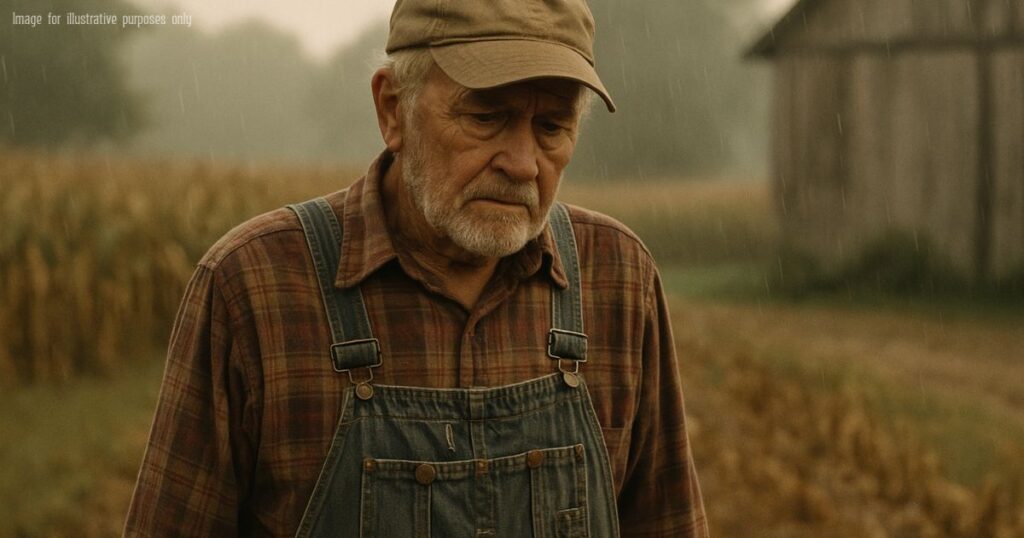I lost my best plow horse to a drone last week. Not literally, mind you, but it might as well have been. I was out in the field, turning soil the way my daddy taught me, when this whirring contraption buzzed overhead, mapping my land for some city slicker’s ag-tech startup.
Fifty years I’ve worked this earth, and now they tell me a machine can do it better. If that don’t make an old farmer’s heart ache, I don’t know what will.
I’m Jim Hargrove, born and raised on this 200-acre plot in Iowa, same as my father and his father before him.
These fields ain’t just dirt—they’re my life, my legacy, my church. Every furrow I’ve plowed, every harvest I’ve brought in, carries the weight of the good old days when a man’s worth was measured by the sweat on his brow and the grain in his barn.
Back then, folks respected the farmer. We fed the nation, and we did it with our hands, our hearts, and a stubborn love for the land.
But now? Now I’m just an old man in overalls, invisible to a world that’s forgotten where its food comes from.
Let me take you back to those good old days, when life was simpler, harder, but somehow richer. I was barely out of high school when I took over the farm from my pa.
We didn’t have much—just a few dairy cows, a couple of pigs, and fields of corn and soybeans that stretched as far as the eye could see. Work started before dawn and ended when the stars came out.
I’d be out there with my old John Deere tractor, the one that rattled like it was gonna fall apart but never did.
My wife, Mary, God rest her soul, would bring me coffee and a sandwich at noon, and we’d sit under the big oak by the barn, dreaming about the future.
We weren’t rich, but we were proud. Every bushel of corn, every gallon of milk, was proof we were doing right by the land and by each other.
The work was brutal, don’t get me wrong. Blizzards that froze your fingers to the bone, droughts that turned your fields to dust, and markets that could tank your whole year’s work with one bad price swing.
I remember the summer of ’83, when the rains didn’t come, and we lost half our crop. Mary and I sat up nights, wondering how we’d pay the bank. But we got through it, same as always, because that’s what farmers do.
We grit our teeth, say a prayer, and keep going. That’s the kind of stubborn that built this country, and I’m darn proud to carry it.
But those days are fading, and it’s not just the years piling up on my bones. The world’s changed, and not for the better, if you ask me. These days, farming ain’t about the land—it’s about algorithms, satellites, and big corporations who think they can outsmart Mother Nature.
I see these young folks with their fancy degrees, sitting in air-conditioned offices, telling me how to plant my crops. They got drones that scout the fields, apps that tell you when to water, and tractors that drive themselves.
Last year, a fella from one of those ag-tech companies came out here, all smiles and slick talk, trying to sell me a “smart farming” package. Said it’d double my yield with half the work. I asked him if his machine could smell the rain coming or know when the soil’s too tired to give.
He just laughed, like I was some fool stuck in the past.
It ain’t just the technology that stings. It’s the way folks look at us now, especially the young ones. To them, I’m just an old relic, a dinosaur who don’t know nothing about the modern world.
They don’t see the calluses on my hands or the years I spent learning this land like it was my own child. They see a guy in a flannel shirt and think, “Why’s he still doing it the hard way?”
They don’t understand that farming ain’t just a job—it’s a way of life. It’s waking up at 4 a.m. to check on a sick calf. It’s the smell of fresh-cut hay on a summer evening. It’s the pride of knowing you’re feeding folks you’ll never meet. But try telling that to a kid glued to his phone, and he’ll just roll his eyes.
The worst part?
The policies coming out of Washington don’t help.


